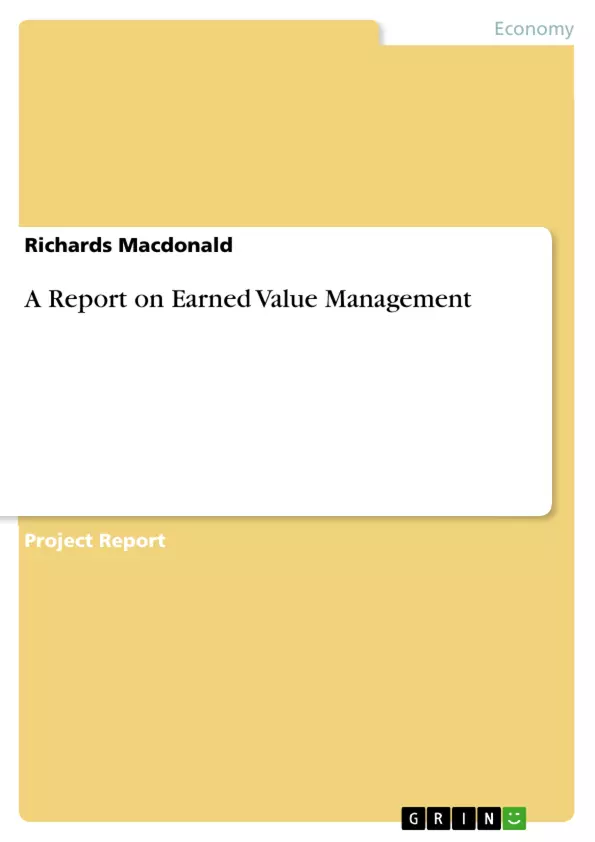This paper recommends an established method comprising of time dependence into Earned Value (EV) management. The criterion needs three parameters, which outline directly to the basic triad control of scope, cost and schedule - the decline rate of activities, the cost prevails over parameter, and the time to fix the declined activities. Time related aspects for the planned value, received value, and genuine cost are acknowledged, along with the cost performance index (CPI) and schedule performance index (SPI).
Earned Value Management (EVM) method is usually represented as a management tactic that influences resource planning and practice to programs and to technical presentation demand. More particularly, EVM can be believed to bring cost and schedule deviation analysis in order to provide managers with a more precise standing of a project.
Increasing global rivalry and speedy industrial developments are exerting many firms to give more concentration to develop the control of both their in-house projects and those being done for customers.
The major purpose of this paper is to map the research intended at establishing an EVM implementation model (framework) to assist in applying EVM more competently to projects in a variety of industries and government organizations. An extra focus is to conclude what distinctness, if any, are present between applying EVM in various types of projects and organizations in the United States (Warburton, 2011).
Table of Contents
- Introduction
- Theoretical Background
- Analysis of EVM
- Application of EVM
- Earned Value Methods and Techniques
- Case-study of Carlos Group of Consultants
- Preliminary Reports
Objectives and Key Themes
This paper aims to present an established method that incorporates time dependence into Earned Value (EV) management. The study explores the application and effectiveness of EVM in various industries and government organizations, highlighting its potential to improve project control and resource management.- Time Dependence in Earned Value Management
- EVM Implementation Models and Frameworks
- Analysis of EVM Cost and Benefits
- Case Studies and Practical Applications of EVM
- EVM Methods and Techniques for Project Control
Chapter Summaries
- Introduction: This chapter introduces the concept of time dependence in Earned Value (EV) management, highlighting its importance in improving project control. It discusses the basic triad of scope, cost, and schedule, and the role of EVM in addressing these aspects.
- Theoretical Background: This chapter provides a review of existing EVM literature, exploring its strengths and limitations. It examines the challenges and complexities associated with EVM implementation, including cost, complexity, and paperwork. It also discusses the importance of comprehensive research and analysis to enhance EVM effectiveness.
- Analysis of EVM: This chapter examines the cost implications of EVM implementation, drawing on existing studies and research findings. It discusses the cost premium associated with EVM and analyzes potential areas for cost optimization. It also highlights the importance of a systematic approach to EVM implementation.
- Application of EVM: This chapter details the key components and principles of Earned Value Management (EVM), emphasizing its role in project control and resource allocation. It explores the three main constituents of EVM – BCWS, BCWP, and ACWP – and their application in measuring project performance.
- Earned Value Methods and Techniques: This chapter outlines the core characteristics of EV methods and systems, emphasizing the principles of stability, objectivity, and auditability. It provides an overview of various techniques used for assessing project progress and ensuring accountability.
- Case-study of Carlos Group of Consultants: This chapter presents a case study of a software development project to illustrate the application of EVM principles in real-world scenarios. It demonstrates how EVM can be used to monitor progress, track costs, and identify potential issues in project execution.
Keywords
Earned Value Management, EVM, project management, time dependence, cost control, schedule management, implementation models, frameworks, case studies, industry standards, cost premium, project control, resource allocation, BCWS, BCWP, ACWP, stability, objectivity, auditability.Frequently Asked Questions
What is Earned Value Management (EVM)?
EVM is a management tactic that integrates project scope, cost, and schedule to provide a precise status of project performance.
What are the three main parameters of EVM?
The core parameters are Planned Value (BCWS), Earned Value (BCWP), and Actual Cost (ACWP).
How does time dependence affect EVM?
Incorporating time dependence helps project managers understand the decline rate of activities and the time needed to fix issues, leading to better schedule control.
What are CPI and SPI in project management?
CPI stands for Cost Performance Index and SPI stands for Schedule Performance Index; both are used to measure the efficiency of a project.
What are the challenges of implementing EVM?
Challenges include high implementation costs, complexity of the systems, and the increased amount of paperwork required for auditability.
- Quote paper
- Richards Macdonald (Author), 2012, A Report on Earned Value Management, Munich, GRIN Verlag, https://www.grin.com/document/213365



